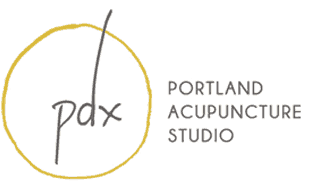
Polycystic Ovarian Syndrome (PCOS) is one of the most common causes of infertility in people who want to become pregnant. It is a complex syndrome involving hormone imbalance, metabolic disruption, and inflammation.
Fun fact: only about 80% of people diagnosed with PCOS actually have polycystic ovaries and 25% of people who don’t have PCOS do have polycystic ovaries. The follicles in the ovaries that indicate a ‘polycystic morphology’ aren’t the same as ovarian cysts – they’re abnormally growing follicles. Honestly, it’s a poorly named condition.
PCOS involves disruption in five main areas: androgen hormones, menstrual/ovulatory dysfunction, polycystic ovaries, insulin resistance, and inflammation. Each of these areas can interfere with fertility, but not every person with PCOS experiences issues in all the areas.
Those with excess androgen hormones (AKA hyperandrogenism) may experience extra body hair, acne in the upper body (especially the face and upper back), and a receding hairline. From a fertility perspective, excess androgen hormones become part of a self-feeding cycle of hormone disruption that causes too much Luteinizing Hormone and too little Follicle Stimulating Hormone, resulting in poor egg development and difficulty ovulating.
People with PCOS who have menstrual and ovulation dysfunction have a hard time conceiving because it can be difficult to know when they are ovulating so they know when to try to conceive.
Many people with PCOS have irregular periods and some of the ovulation predictor kits don’t work as well in people with high LH. Polycystic ovaries also impact fertility in that the many follicles in the ovaries produce androgens which feeds into the hormonal disruption discussed above.
Other fertility-influencing factors that go along with PCOS are insulin resistance and inflammation. 60-84% of people diagnosed with PCOS also have insulin resistance. Insulin resistance is present in PCOS patients who are lean as well as those who are heavier. It influences the egg quality as well as early pregnancy loss (miscarriage) rates.
Chronic low-grade inflammation is considered both a cause and result of PCOS in another self-feeding cycle. Inflammation comes from things like endocrine-disrupting chemicals, smoking, byproducts of over-cooked foods, etc. Once inflammation is present, it produces chemical messengers that feed back into the loop, causing further hormone disruption.
That’s all the bad news. The good news is that there are many things you can do to improve your chances of getting pregnant with PCOS. Acupuncture, herbs, supplements, and changes to your diet and exercise habits can have a profound influence on the level of inflammation and insulin resistance in your body. In some cases, those are not enough and medications are required to re-establish healthy insulin levels and induce ovulation.
Many people don’t know that acupuncture can influence hormone balance and inflammation in the body. Combining acupuncture with herbs, supplements, and lifestyle changes give you a great chance to regulate your menstrual cycles and ovulation. We at Portland Acupuncture Studio have helped many PCOS patients get pregnant with acupuncture: some with medicated cycles, some without medication, and some with IVF. There are a lot of paths on the infertility journey. We would love to be part of yours.
Learn more about acupuncture for PCOS and fertility
Contact us today to learn more about how we can support your fertility needs.
Established patients can schedule online, patients who haven’t seen us at Kwan Yin Healing Center call (503) 701-8766, or email us to schedule your appointment.




